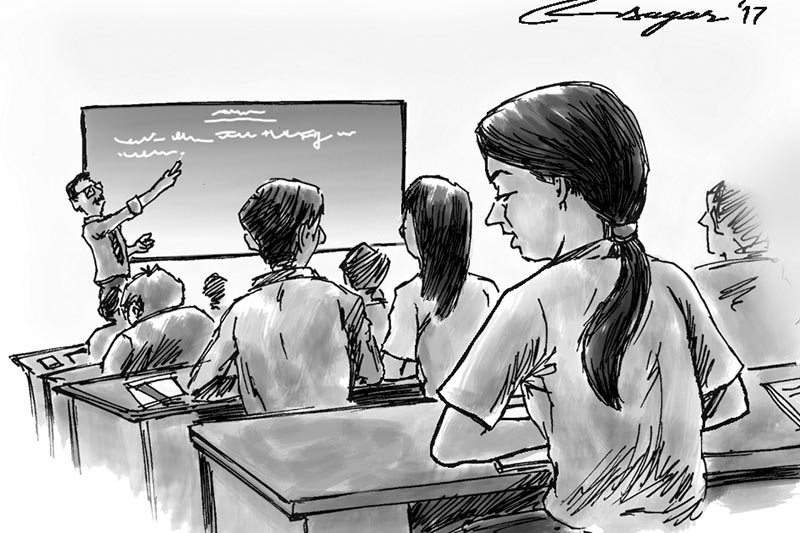Academic stress at schools: Causes and management
It is not the load that may break students down, but the way they’re carrying it. Like any other problem, stress also requires a strategic approach to conquer or at least to manage
School education in Nepal is a very important turning point in the academic life of students for a further career move. As their educational requirements become more stringent students experience stress at this level.
Stress is a pressure or worry or strain or tension, resulting from mental or social or physical or emotional distress, difficult circumstances etc. It arises due to the demands on students from outsides sources, such as family, school, friends, jobs and also from within. Stress affecting students can be categorized as academic, financial, time or health related and self-imposed. All these brew up a perfect storm of stress in their minds and create an inability to meet them. The students cannot go through life in a happy-go-lucky fashion. Through stress our body tells us something is going on wrong and if it is significant and frequent or does not go away, that’s when it is time to seek help. Academic stress is a mental stress because of some anticipated frustration associated with parental pressure on high performances; tough class load; worry over grade competitions; sports etc. Consequently, it puts an enormous amount of stress on children which may lead to wrong decisions or lead to use of suitable copying strategies like alcohol, drug etc. and it could be too late to recover. In the context of Nepal, a high-grading from school is considered as a passport for higher studies, especially in the fields of Medicine, Engineering, Computer Science, Management etc. Thus, in every step of their academic career our students are stressed and depressed by success-obsession. Winning a scholarship for MBBS is a matter of prestige and a huge relief of financial burden, too.
School, family, society and environment are considered major causes of academic stress, which threaten to disrupt students’ daily functioning. In school too much home-works, pressure of exams, poor academic performance, grade competition with friends, poor interpersonal relationship with teachers and friends, heavy contents to master in a limited time, unscientific academic evaluation procedure, imbalanced curriculum and extra-curricular activities, high student-teacher ratio, non-conducive physical environment of classrooms, unhealthy teacher-student interaction, irrational rules of discipline, ineffective teaching methodology, indifferent attitude of teachers, over emphasis on weaknesses rather than strength of students, poor reading habits and time management of students, lack of the student’s interest in a particular subject, the teacher’s corporal punishments and high expectations of teachers, parents and student himself/herself are agonies for students. It is true that parents and schools play a significant role in the cognitive, social and emotional development of children through socialization, cultural and societal norms and values that can prepare them for tomorrow. They are, therefore, supposed to be aware of their children’s behaviors, interests, abilities, and emotions.
They must build trust with their children; pay respect to their interests with love and care; encourage them to express their feelings; give them good emotional responses; encourage them to maintain healthy and diverse friendship; teach them problem solving ways in difficult situations; make them aware of the harmful effects of drugs and alcohol before experimentation begin; teach them various methods of stress management techniques like Yoga, meditations; inspire them to read extra books and newspapers; help them engage in sports, recreational activities etc. that can have therapeutic effects on children. The more students share their problems, feelings, interests, issues and desire with parents and teachers, the better opportunities they get to progress without any stress.
Our students can reduce stress if they could manage time wisely with goals setting; being always organized; eating healthy food, keeping a healthy mind and enough sleep; creating a good study environment, knowing their strength and weakness and their learning style and skills well; developing optimism; doing regular exercises - Yoga, meditation; sporting and recreational activities; surrounding themselves with supportive people and stop comparing with others learn to be assertive and stand up for themselves.
It is true that high aspirations and negative attitudes lead to mental disorder, depression, stress and even suicide among students. Therefore, parents and schools should let the children go ahead as per their interests and abilities without imposing their interests on their minds.
It is not the load that may break students down, but the way they’re carrying it. Like any other problem, stress also requires a strategic approach to conquer or at least to manage. Students must be strong enough to handle their challenges skillfully, wise enough to find solutions to the problems, and capable enough of doing whatever are needed to be done.
They must reconnect to what makes them happy that brings them joy and should not let the outside world determine it for them. Students are not robots. If the students are guided and encouraged by parents and teachers as per their abilities, interests, and aptitude, there is no doubt, they would naturally make their academic dreams come true without any stress, and our support can act as a buffer against stress.
Dr. Gnawali is the Founder Principal of Universal College, Kathmandu






